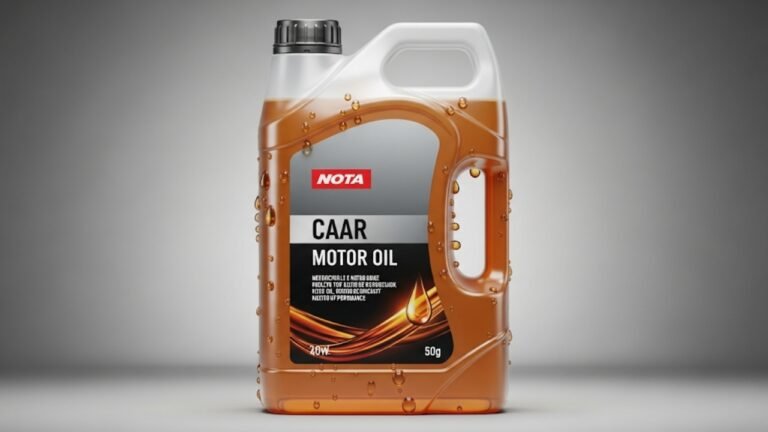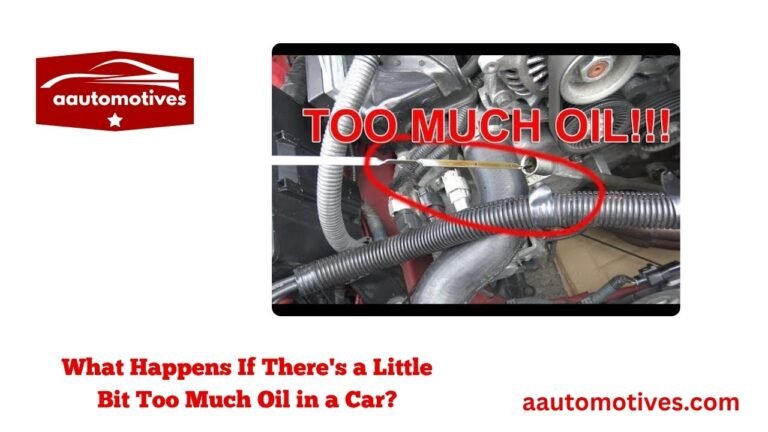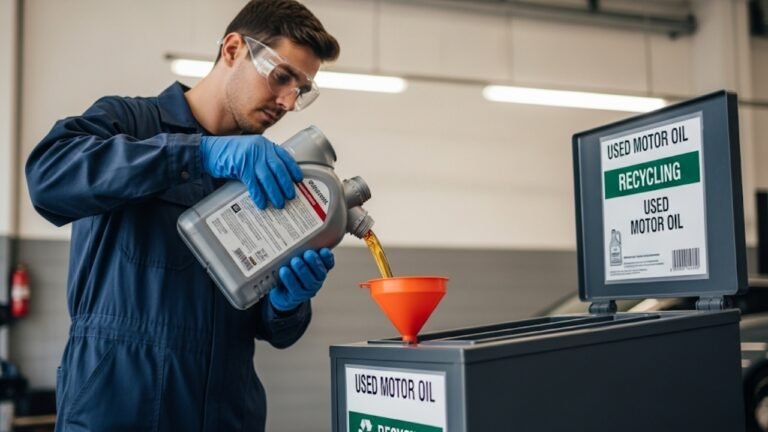Why Is My Car Leaking Oil or Water? A Friendly Guide

Have you ever stepped outside, looked under your car, and spotted a small puddle of mystery fluid? If so, you’re not alone. It’s one of those heart-sinking moments where your brain races: “Is that oil? Water? Is something wrong? Should I call a mechanic now or wait?” I’ve been there too—standing in my driveway, coffee in hand, staring at a stain like it’s some kind of omen.
This guide is for anyone who’s asked themselves, “Why is my car leaking oil or water?” We’re diving into the reasons, signs, solutions, and prevention tips. I’ll keep it simple and real—no jargon or complicated terms. Just like chatting with a friend who knows cars a bit better than you do.
So, buckle up. Whether it’s a small drip or a worrying stream, we’ll walk through everything together—calmly, clearly, and with a few stories from real-life roadside dramas.
Common Causes of a Car Leaking Oil or Water

1. Oil Leak Causes
Oil leaks are serious. Your engine needs oil to run smoothly and stay cool. If it’s leaking, that’s a red flag.
Here are some common culprits:
-
Worn-out oil pan gasket
-
Loose or broken oil filter
-
Damaged valve cover gasket
-
Cracked engine block (rare but possible)
-
Overfilled engine oil
-
Old, hardened seals and gaskets
Most of these issues come with age or wear and tear. I once ignored a tiny oil spot for two weeks—big mistake. The small leak turned into a full-blown oil trail, and let’s just say, my wallet still holds a grudge.
2. Water Leak Causes
Water isn’t always a big deal. Sometimes, it’s just condensation from the AC system—totally normal. But other times, it could be coolant or rainwater getting in where it shouldn’t.
Here’s a quick list of possible water leak causes:
-
AC condensation (harmless)
-
Coolant system leak (watch out)
-
Leaky windshield or sunroof
-
Faulty radiator or radiator cap
-
Blocked drainage hoses
Pro Tip: If it’s clear, odorless, and only leaks when the AC is on, it’s probably harmless condensation. But if it smells sweet or feels slimy, it might be coolant.
How to Identify the Type of Leak
Sometimes, just looking at the color, feel, or smell of the fluid can tell you what’s going on. Here’s a handy table to help you spot the difference:
| Fluid Type | Color | Texture | Smell | Likely Cause |
|---|---|---|---|---|
| Engine Oil | Brown or black | Slick, thick | Oily or burnt | Oil pan, gasket, valve cover |
| Water | Clear | Watery | Odorless | AC condensation or rainwater |
| Coolant/Antifreeze | Green, pink, or orange | Slimy | Sweet | Radiator, water pump, or hoses |
| Transmission Fluid | Red or pink | Slick | Slightly sweet or tart | Transmission seal or pan |
| Brake Fluid | Clear to yellow | Very slick | Chemical or fishy | Brake lines or master cylinder |
Symptoms to Watch If Your Car Is Leaking Oil or Water
Beyond spotting puddles, there are other signs your car might be leaking oil or water. Pay attention to how your car feels—that gut sense is often right.
Oil Leak Symptoms
-
Burning oil smell inside the cabin
-
Smoke from engine bay
-
Low oil level warning on the dashboard
-
Dark puddles under the car
-
Engine feels hotter than usual
When I had a valve cover leak, I noticed a smell like fried rubber. Turns out, oil was dripping onto the hot exhaust. That could’ve turned into a fire hazard.
Water Leak Symptoms
-
Wet floor mats (especially passenger side)
-
White smoke from exhaust pipe (if coolant is leaking internally)
-
Overheating engine
-
Coolant reservoir low
-
Foggy windshield (from heater core leaks)
Don’t brush these off as “just a little water.” Some water leaks can damage electronics or lead to rust over time.
What to Do Immediately After Spotting a Leak
You don’t need to be a mechanic to take the right steps. Here’s what to do the moment you spot a leak:
Step-by-Step Action Plan
-
Don’t panic.
Look calmly and try to identify the leak’s color and smell. -
Place cardboard under your car.
This helps trace where the leak is coming from and how much is leaking overnight. -
Check fluid levels.
If oil or coolant is low, top it off if you need to drive short-term. -
Avoid long trips.
If it’s oil or coolant, don’t risk highway driving until it’s checked. -
Visit a mechanic if unsure.
Especially if you’re seeing oil or coolant under the car, it’s better to be safe than sorry.
Is It Safe to Drive with a Car Leaking Oil or Water?
Short answer? It depends. Let’s break it down:
Oil Leak: Be Cautious
Driving with an oil leak can be risky. Even a slow drip can lead to engine damage if the oil level gets too low. If your car is leaking oil, it’s best to get it inspected quickly. Running an engine low on oil can cause it to seize up, which is a very expensive fix.
Water Leak: Depends on the Source
If it’s just AC condensation, you’re fine. But if it’s coolant, then it’s serious. Without coolant, your engine can overheat and crack. Water leaks into the cabin can damage carpets, wiring, and even lead to mold growth if not treated.
DIY Fixes You Can Try at Home
Now, I’m all for calling a pro when things get messy, but some leaks are easy to patch up at home.
Here are some safe DIY tips:
-
Tighten your oil filter – Sometimes it just needs a little snug.
-
Use a UV leak detection kit – Add dye to your fluids and use a UV light to see the exact source.
-
Seal minor gasket leaks – Try stop-leak products if the leak is tiny.
-
Clear AC drainage hoses – If water’s pooling inside, check if the AC drain is clogged.
That said, if the leak continues even after your fix, don’t push it. Better safe than sorry.
When to Call a Mechanic for Oil or Water Leaks
There comes a point when DIY fixes just don’t cut it. Trust me, I’ve been there—covered in oil, flashlight between my teeth, wishing I’d just called a mechanic in the first place. If you notice any of the following, it’s time to let the pros take over.
Signs It’s Time to Call for Help:
-
Leak gets worse overnight
-
Engine temperature goes above normal
-
You see white smoke from the exhaust
-
Fluid looks milky (indicating oil and coolant are mixing)
-
Dashboard shows low oil or coolant alerts
-
The leak is coming from a hard-to-reach area like the engine block
Mechanics have tools like pressure testers, UV dye kits, and diagnostic scanners to find issues fast. While you might spend a bit on labor, it beats frying your engine and paying triple down the road.
How Much Does It Cost to Fix a Car Leaking Oil or Water?
Ah, the golden question. Repair costs vary wildly depending on where the leak is and what’s causing it. Here’s a quick breakdown:
| Leak Type | Likely Component | Estimated Repair Cost (USD) |
|---|---|---|
| Minor Oil Leak | Gasket, seal, or oil pan | $100 – $400 |
| Major Oil Leak | Rear main seal, head gasket | $500 – $1,500+ |
| AC Condensation (harmless) | None | $0 |
| Coolant Leak | Radiator, hoses, water pump | $150 – $900 |
| Windshield or cabin leak | Weatherstripping/seals | $100 – $350 |
| Heater Core Leak | Heater core | $500 – $1,200 |
A leak might look small, but labor costs can add up if parts are buried deep. Always get a second opinion before approving big repairs.
How to Prevent Oil or Water Leaks in the Future
Let’s face it: prevention is always cheaper than repair. Here are some friendly reminders and habits that help you avoid seeing those dreaded puddles under your car.
Oil Leak Prevention Tips:
-
Get regular oil changes using the correct oil grade.
-
Don’t ignore small drips—they get worse.
-
Replace old gaskets and seals during routine maintenance.
-
Avoid overfilling your engine with oil.
-
Use high-quality engine oil with detergents that prevent sludge buildup.
Water Leak Prevention Tips:
-
Flush your coolant system as per your car’s service manual.
-
Keep drainage channels clear—especially near the windshield and sunroof.
-
Check and replace radiator caps if they look corroded.
-
Seal weatherstripping around windows and doors.
-
Park in a garage or under a cover to reduce water exposure.
You’d be surprised how far regular TLC goes. My own car’s been leak-free for three years now, and all I really do is stay on top of maintenance. That’s it.
The Emotional Toll: It’s Not Just a Car Problem
Now let’s get real for a second. When your car leaks, it doesn’t just drip oil—it leaks stress, too. Especially if you rely on your vehicle for work, school runs, or family errands. There’s a feeling of helplessness that creeps in when something feels off under the hood.
I remember one rainy night, my car wouldn’t start after a coolant leak drained the reservoir. I was alone, soaked, and scared. That’s when I realized—knowing the basics empowers you. You don’t have to be a mechanic, but when you understand what’s going on, you can take control of the situation.
This guide isn’t just about fixing a car leaking oil or water. It’s about feeling capable, smart, and calm in the face of mechanical surprises.
FAQs About Car Leaking Oil or Water
Let’s wrap up with some quick answers to common questions people ask when dealing with car leaks.
1. Can I drive a short distance with an oil leak?
Yes, if it’s very minor and your oil level is topped up. But monitor it closely. If you see smoke or smell burning oil, stop immediately.
2. Why is there water under my car after using the AC?
This is usually just condensation from the air conditioning system, and it’s totally normal. No need to worry.
3. Is a coolant leak dangerous?
Yes. Coolant keeps your engine from overheating. A slow leak might seem minor, but it can cause serious damage fast if ignored.
4. Can oil and coolant mix?
Yes—and that’s a bad sign. If you see milky white sludge, it could mean a blown head gasket, which needs urgent repair.
5. How do I tell if it’s coolant or just water?
Coolant is often green, pink, or orange and smells sweet. Water is clear and odorless. Touching and smelling (carefully) can help you tell.
6. Is a small oil leak an emergency?
Not always—but it should never be ignored. Even a small leak can cause long-term damage or suddenly become worse.
7. How often should I check for leaks?
Make it a weekly habit, especially if your car is older. Just take a quick look under the car or use a piece of cardboard overnight.
8. Will an oil stop-leak product work?
Sometimes, for very minor leaks in gaskets or seals. But it’s not a long-term fix. Think of it like a band-aid, not surgery.
Final Thoughts: Stay Calm, Stay Curious
Look, having a car leaking oil or water isn’t fun. It feels inconvenient, messy, even a little scary. But the key is to stay curious, not panicked. Every leak tells a story—sometimes it’s harmless, sometimes it’s a warning.
What matters is how you respond. Learn to read your car like a trusted friend. Stay alert, stay proactive, and most of all, trust your instincts. Whether it’s a quick DIY fix or a trip to the shop, you’ve now got the knowledge to handle it smartly.
So the next time you spot a puddle under your car? Take a breath. You’ve got this.






